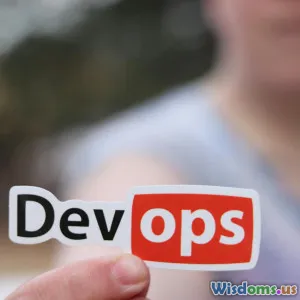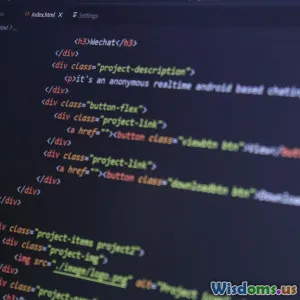
So trägst du zu Open-Source-Projekten bei
(How to Contribute to Open Source Projects)
6 Minute gelesen Lerne, wie du effektiv zu Open-Source-Projekten beiträgst und deine Programmierfähigkeiten verbesserst. (0 Bewertungen)
How to Contribute to Open Source Projects
Contributing to open source projects is a rewarding way to improve your programming skills, collaborate with a global community, and make a tangible impact in the tech world. This article provides a step-by-step guide to help you navigate the process of contributing effectively.
What is Open Source?
Open source refers to software whose source code is freely available for anyone to view, modify, and distribute. This model promotes collaborative development and transparency, enabling developers from all backgrounds to contribute.
Why Contribute to Open Source?
- Skill Development: Working on real-world projects helps you refine your coding skills and learn new technologies.
- Networking: Engage with other developers, leading to potential job opportunities and collaborations.
- Portfolio Building: Contributions to well-known projects can enhance your resume and showcase your abilities to potential employers.
- Giving Back: Support projects that you use and benefit from, helping to sustain the open-source ecosystem.
Steps to Get Started
1. Identify Your Interests
Start by determining the types of projects that interest you. Consider your programming language proficiency, preferred technologies, and areas you would like to explore. Websites like GitHub and GitLab have numerous repositories across various domains.
2. Explore Projects
Use platforms like GitHub to search for projects that align with your interests. Look for repositories labeled with good first issue or beginner-friendly, which are designed for newcomers. You can also check out sites like Up For Grabs or Awesome for Beginners for curated lists of beginner-friendly projects.
3. Understand the Contribution Guidelines
Once you find a project, read its documentation carefully. Most open source projects have a CONTRIBUTING.md file that outlines how to contribute, coding standards, and submission processes. Familiarizing yourself with these guidelines is crucial to ensure your contributions are accepted.
4. Set Up Your Development Environment
Fork the repository to your GitHub account and clone it to your local machine. Ensure you have the necessary tools and dependencies installed to run the project locally. This might include setting up a specific programming language version, package managers, or frameworks.
5. Start Small
Begin by tackling small issues or bugs. This could involve fixing typos in documentation, resolving minor bugs, or adding simple features. Starting small helps you learn the project's codebase without feeling overwhelmed.
6. Make Your Changes
After making your changes, test your code to ensure it works as expected. Follow the project's coding standards and commit your changes with a clear and descriptive message. This clarity helps maintainers understand your contributions better.
7. Submit a Pull Request (PR)
Once your changes are ready, push them to your forked repository and submit a pull request to the original repository. Include a detailed description of your changes and reference any related issues. Be open to feedback from project maintainers, and be prepared to make adjustments based on their suggestions.
8. Engage with the Community
Participate in discussions, ask questions, and provide feedback on others' contributions. Engaging with the community enhances your experience and can lead to lasting connections.
Overcoming Challenges
Contributing to open source can be daunting, especially for beginners. Here are some tips to overcome common challenges:
- Imposter Syndrome: Remember, every developer was once a beginner. Your contributions, no matter how small, are valuable.
- Getting Stuck: Don’t hesitate to reach out to the community for help. Most open source projects have channels like Discord, Slack, or mailing lists.
- Maintaining Motivation: Set realistic goals and celebrate your achievements, no matter how small.
Conclusion
Contributing to open source projects is an enriching experience that can significantly enhance your programming skills and professional network. By following these steps, you can navigate the world of open source with confidence and make meaningful contributions. Start small, be patient, and enjoy the journey of collaboration and learning!
Bewerten Sie den Beitrag
Benutzerrezensionen
Weitere Beiträge in Softwareentwicklung
Beliebte Beiträge














